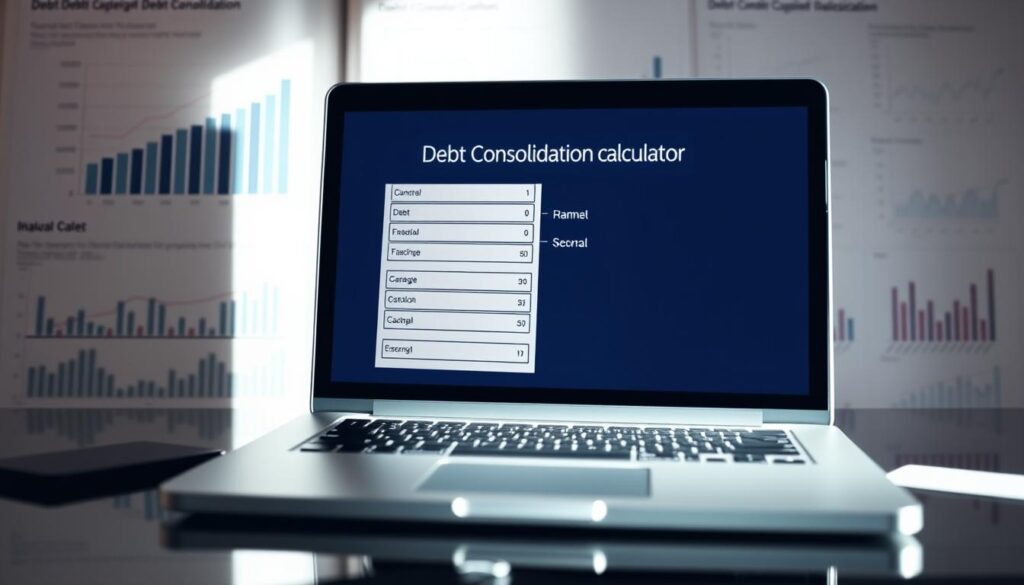Debt consolidation helps people take back control of their money. It combines many debts into one with a lower interest rate. This way, you only have one monthly payment to worry about. To learn more about debt consolidation options and managing debt during tough times, it’s key to understand the basics.
Introduction to Debt Consolidation
Knowing how to consolidate debt is vital for those with many debts. Debt consolidation makes managing your debt easier. It can lower your interest rates and monthly payments, helping you pay off your debts faster.
Key Takeaways
- Debt consolidation combines multiple debts into one loan with a lower interest rate
- Debt consolidation options can help simplify debt and make it more manageable
- Consolidating debt can reduce interest rates and monthly payments
- Understanding how to consolidate debt is crucial for individuals struggling with multiple debts
- Debt consolidation can help individuals regain control of their finances
- Exploring debt consolidation options can help individuals find the best solution for their needs
Understanding Debt Consolidation
Debt consolidation is a way to manage your debts by combining them into one loan. This loan has a lower interest rate and a single monthly payment. It can make your debt easier to handle by reducing interest rates and monthly payments.
One big advantage of debt consolidation is it simplifies managing your debt. You only have to worry about one payment instead of many. Debt consolidation loans often come with lower interest rates, saving you money in the long run.
- Debt consolidation loans: These loans involve borrowing a single amount to pay off multiple debts, resulting in one monthly payment.
- Balance transfer credit cards: These cards allow individuals to transfer multiple debts to a single credit card, often with a lower interest rate.
- Debt management plans: These plans involve working with a credit counselor to create a plan to pay off debt over time.
When looking at debt consolidation, it’s important to find the best option for you. This choice should fit your financial situation. By doing this, you can make your debt easier to manage, lower your interest rates, and work towards being debt-free.
| Debt Consolidation Option | Benefits | Drawbacks |
|---|---|---|
| Debt Consolidation Loans | Lower interest rate, single monthly payment | May require collateral, fees associated with loan |
| Balance Transfer Credit Cards | Lower interest rate, convenience of single credit card | May have balance transfer fees, higher interest rates after introductory period |
| Debt Management Plans | Professional guidance, reduced interest rates | May have fees associated with plan, requires discipline to stick to plan |
Evaluating Your Current Financial Situation
To make smart choices about debt consolidation, you need to know your total debt, credit score, and income. Your credit score is key in getting a good interest rate and loan approval. Even with bad credit, you might still consolidate debt through plans or secured loans.
When looking at your finances, think about these points:
- Total debt amount: Add up what you owe, like credit cards and loans.
- Credit score: Check your report to see your score and how to improve it.
- Income: Look at your monthly income and expenses to see how much you can pay towards debt.
Debt consolidation programs can make your finances simpler and reduce your debt. By consolidating debt with bad credit, you can merge debts into one with a lower rate and one payment. This can save you money and help you pay off debt quicker. Look into different programs to find the right one for you.
Always read the fine print of any debt consolidation loan or program. By understanding your finances and options, you can make a wise choice. This is the first step towards financial freedom.
Choosing the Right Debt Consolidation Method
There are many ways to consolidate debt. It’s important to look at your finances and goals to pick the best one. By exploring different options, you can find what works for you.
One goal of debt consolidation is to make payments easier and lower interest rates. You can use personal loans, balance transfer credit cards, or debt management plans. For more information, check out investing websites on managing your money and finding good debt consolidation choices.
Popular Debt Consolidation Options
- Personal Loans: Offer a fixed interest rate and a single monthly payment
- Balance Transfer Credit Cards: Provide a 0% introductory APR for a limited time
- Debt Management Plans: Involve working with a credit counselor to create a repayment plan
Think about these options and your financial situation to find the right strategy. It’s key to weigh the pros and cons of each. If needed, get advice from a professional. With the right plan, you can manage your debt and reach financial stability.
How to Apply for a Debt Consolidation Loan
Getting a debt consolidation loan is easy if you’re ready. Look for the best rates and terms by comparing lenders. Websites like investcourier can help you manage your money better.
When you’re looking at lenders, think about fees, repayment plans, and customer service. Comparing interest rates and terms is key to making a good choice. Here’s how to start:
- Check your credit score to see what interest rate you’ll get
- Look at rates and terms from different lenders
- Think about getting help from a credit counselor
After picking a lender, apply for the loan. Make sure you understand the agreement before you sign. By doing your homework, you can find a loan that helps you financially.
Remember, debt consolidation loans and programs have their own pros and cons. Choose what’s best for your money situation.
The Role of Credit Counseling
Credit counseling is key in managing debt. It offers debt consolidation strategies and debt consolidation tips to help with finances. A good credit counseling service can make a budget, plan debt repayment, and talk to creditors.
When looking for a service, choose non-profit ones that are accredited. Look for the National Foundation for Credit Counseling’s seal of approval.
At counseling sessions, you’ll talk about your money situation, make a budget, and plan to pay off debt. It’s important to pick a trustworthy service. This way, you get the right advice for your needs. For more info, check out the Consumer Financial Protection Bureau website.
Some benefits of credit counseling are:
- Personalized budgeting and debt repayment plans
- Negotiation with creditors to reduce interest rates or fees
- Education on debt consolidation strategies and debt consolidation tips
Working with a reputable credit counseling service helps you understand your finances better. It also helps you find effective debt consolidation strategies to reach financial stability.
Creating a Budget After Consolidation

After you’ve consolidated your debt, making a budget is key to moving forward. You need to decide on a payment amount and when it’s due. Even if you have bad credit, you can still manage your debt by tracking your spending.
Using a budgeting app or spreadsheet can keep you organized. The Federal Trade Commission’s website has great tips on budgeting and managing debt. It’s important to keep track of your expenses to make sure your budget works.
- Calculate total monthly income
- List all fixed expenses, such as rent and utilities
- Determine a realistic payment amount for debt repayment
By following these steps and using debt consolidation programs, you can manage your debt well. This will help you move towards financial stability.
Consolidating debt with bad credit needs careful planning and discipline. But with the right tools and resources, you can take back control of your finances. This will lead to long-term financial stability.
| Debt Consolidation Method | Benefits |
|---|---|
| Personal Loans | Lower interest rates, simplified payments |
| Balance Transfer Credit Cards | 0% introductory APR, consolidated payments |
Avoiding Common Debt Consolidation Pitfalls
When looking into debt consolidation loans, it’s key to know the common traps that can worsen your financial situation. Understanding the loan’s terms and conditions is a crucial part of any debt consolidation plan.
Maintaining Old Credit Accounts
Keeping old credit accounts open can lead to overspending and more debt. It’s important to close unused accounts to avoid temptation and reduce identity theft risks. This way, you can better focus on your debt consolidation efforts and work towards becoming debt-free.
Understanding Fees and Costs
It’s vital to understand the fees and costs of debt consolidation loans. Read the fine print and ask about any charges, like origination fees, interest rates, and late fees. Knowing these costs helps you pick the right debt consolidation plan for your situation and avoid common mistakes.
By being aware of these common pitfalls and taking steps to avoid them, you can successfully manage debt consolidation. Effective strategies, like debt consolidation loans, offer a fresh start and help you regain control of your finances.
Impact on Credit Score

Debt consolidation can greatly affect your credit score. It’s key to know how it might change your score. Using a debt consolidation calculator can guide you in making smart choices about your money.
To lessen the negative effects on your credit score, follow some tips. Pay bills on time, use your credit wisely, and check your credit reports often.
Short-Term vs. Long-Term Effects
At first, debt consolidation might lower your credit score. This is because of hard inquiries and new accounts. But, over time, it can boost your score. This is because it reduces your debt and helps you pay on time.
Steps to Rebuild Credit
- Make on-time payments to show you’re responsible with credit.
- Keep your credit use low to prove you’re using it smartly.
- Check your credit reports regularly to spot any mistakes or issues.
Staying Motivated During the Process
Debt consolidation can be tough, but staying motivated is key to success. Using good debt consolidation strategies can make finances simpler and help you become debt-free. Setting realistic goals and celebrating milestones can keep you motivated.
Setting goals helps you stay focused and motivated. It gives you a clear path and a sense of accomplishment. Celebrating milestones, like paying off a credit card, boosts your pride and motivation. Debt consolidation programs offer support and guidance, helping you stay on track.
- Share your goals with a friend or family member to stay accountable.
- Track your progress and celebrate small wins.
- Get help from a credit counselor or financial advisor.
By following these tips and using effective strategies, you can stay motivated. With the right mindset and support, anyone can overcome debt and achieve financial freedom through debt consolidation programs.
Frequently Asked Questions About Debt Consolidation
When you think about debt consolidation, it’s key to know what it means and how it might affect your money. You should understand the risks and how long it might take. This knowledge helps you decide if debt consolidation loans are good for you.
Understanding the Risks
Debt consolidation can have risks, like getting into more debt or not fixing your money problems. To avoid these, it’s important to make a budget and stick to it. Knowing these risks helps you take steps to stay safe and succeed in consolidating your debt.
Consolidation Timeline
The time it takes to consolidate debt changes based on your financial situation and the method used. It usually takes a few months to a couple of years. Being patient and persistent is crucial. By following tips and staying focused, you can reach financial stability and better well-being.
Knowing the risks and how long it takes helps you decide if debt consolidation loans are right for you. Always follow good debt consolidation tips and get professional advice when needed.
Seeking Professional Help: When to Consider It
Debt consolidation can help simplify your finances. But sometimes, you might need professional help. If you’re feeling overwhelmed or struggling to pay off debt, a financial advisor could be a good choice.
Signs You Need Additional Assistance
A financial advisor can guide you through debt consolidation. They can help you create a plan to pay off your debt. Here are some signs you might need their help:
– You can’t stick to a budget
– You keep using credit cards
– You’re unsure about your financial choices
– You don’t know which debt consolidation programs to use
Finding a Financial Advisor
Look for advisors who specialize in debt management. The National Foundation for Credit Counseling (NFCC) has certified counselors. You can also ask your bank or credit union for recommendations.
Seeking professional help shows you’re serious about your finances. With the right advisor, you can create a plan to become debt-free and reach your financial goals.
FAQ
What Are the Risks of Debt Consolidation?
Debt consolidation can lead to more debt or not fix financial problems. It’s key to think about both sides before deciding. Look at other options too.
How Long Does It Take to Consolidate Debt?
Consolidating debt time varies by your financial situation and chosen method. It can take weeks to months. This depends on debt complexity and lender approval.
When Should I Consider Seeking Professional Help for Debt Consolidation?
Get professional help if managing debt feels too hard. Signs include feeling overwhelmed or not making debt progress. A financial advisor can help with a plan and support.
What Are the Common Types of Debt Consolidation?
Common types include personal loans, balance transfer cards, and debt management plans. Each has pros and cons. Choose what fits your financial needs best.
What Are the Benefits of Debt Consolidation?
Consolidation can lower interest rates and monthly payments. It simplifies managing debt. It can also boost your credit score by reducing debt and making timely payments.
What Is Debt Consolidation?
Debt consolidation combines multiple debts into one with a lower rate and one payment. It can simplify and lower payments, helping manage debt better.


